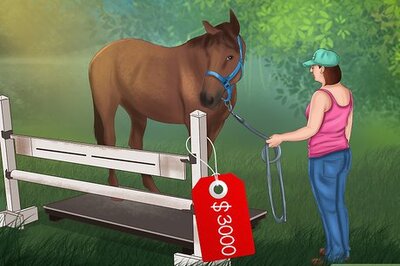
views
Santa Monica (California): In 2013, director Lulu Wang was told that her grandmother had stage 4 lung cancer and had three months to live. The family had decided not to tell the matriarch of the diagnosis, believing that no good could come of it, and devised an elaborate ruse — a wedding banquet, in her hometown Changchun — as an excuse for everyone to go to China to see her one last time.
Wang thought the situation, with its mix of pathos and absurdity, would make a fine film, but she couldn’t find any takers. With its all-Asian cast, she was told, it was too Chinese for the American market. “And when I pitched it to Chinese producers, they were like, ‘Why is this dramatic? Everybody in China does this.’”
The story of love and deception forms the basis of Wang’s new comic drama, “The Farewell.” Billed as “based on an actual lie,” the film premiered at Sundance in January, where it earned rave reviews for both Wang’s directing and the performance of Nora Lum, aka the rapper Awkwafina, who appears in her first dramatic lead role.
In the film, Lum stars as Billi, an aspiring artist in Brooklyn who wrestles with keeping the secret from Nai Nai, her grandmother (played by Zhao Shuzhen). Shouldn’t we tell Nai Nai that she’s dying?, Billi wonders. Six years later, however, with the real Nai Nai very much alive, “The Farewell” raises yet another question: Shouldn’t we tell Nai Nai that we made a movie about it?
On a recent afternoon at a Venezuelan cafe not far from the director’s home here in Santa Monica (she rolled up for the interview on her Segway hoverboard), Wang spoke about how often Asians now tell her about their own similar family secrets (“a lot, and not just Asians”), and her early struggles in finding backers for the movie. “Nobody wanted to make this film,” she said.
After several producers passed on it, Wang told her story in a 2016 episode of “This American Life.” The podcast included 2013 interviews with family members, many of whom felt that, given Nai Nai’s advanced age (she was 80 at the time), the shock of the news might be worse for her than the cancer. There were also more recent interviews conducted after her grandmother was in the clear. “Nai Nai had already outlived her three-month prognosis, so my dad was like, ‘See, we did the right thing!’” Wang said. “The whole family was happy to talk about it.”
Nor were they all that concerned about news of “This American Life” getting back to Nai Nai. “They thought it was this niche thing,” she said. “It’s a very American show.”
After the episode ran, however, Wang couldn’t get the idea of a film out of her head. A documentary wasn’t an option, she said, because “I’d have to explain to my grandmother why we’re in her house shooting.”
But when Wang and her crew finally began shooting the feature in 2018, they ended up, yes, in Nai Nai’s house and hometown. Wang wanted to film in the area, she said, because so many of the traditions were so specific to that region. And if she were in the area anyway, why not just film in Changchun? “My grandma was like, why would you come back to China to shoot a movie and not shoot it at home, where I can see you?” she said.
The shoot provided an opportunity for Lum and the rest of the cast to meet the real Nai Nai. “I think she was really proud of Lulu,” Lum said. “She would love to come to set and hang out and joke around. She had one of those motorized scooters, and Lulu had this hoverboard, and between takes they would race.”
The film was also a once-in-a-lifetime chance for Nai Nai to see what her granddaughter does for a living. A classically trained pianist, Wang had worked on music videos and web shorts before directing her first feature, “Posthumous,” a 2015 rom-com. “To her, it’s like, ‘is this a hobby?'” Wang said. “But when I brought home producers, to her it was like, ‘you’re the boss of all these white people?’ I think it was just such a transformational moment of pride for her.”
Even so, the cast and crew kept the plot of the film under wraps when Nai Nai was around. So what did she think the movie was about? “She thought that the movie was loosely based on our family, with everybody coming back to China for a wedding,” Wang said. “There are cultural differences, and hilarity ensues.”
For Lum, playing a character who’s lying through much of the film wasn’t such a stretch. “I’m ashamed to admit how normal it felt,” she said. “I feel that in any family, there are just those ways of behaving. It was the realest character I’ve ever played, just in terms of natural things I would do, as Nora, with my own family.”
Wang took a leap of faith in casting Lum. “This was before ‘Ocean’s 8’ and ‘Crazy Rich Asians,’ so I only knew her from her music videos,” she said. “When my producer brought her up to me, I was like, ‘That’s the girl who did ‘My Vag.’ Why would you think she should play me in a dramatic movie?”
“I think we bonded over the fact that she had been raised by her Chinese grandmother as well,” Wang continued. “And she was very self-deprecating. She told me, ‘I really want to do this, but nobody’s giving me a chance because they see Awkwafina and that’s all that they think that I am.’”
Wang also gambled in casting Hong Lu, Nai Nai’s real-life sister, to play herself. Lu, who made the initial decision not to tell Nai Nai about her diagnosis, had never been in a film before in her life. “When Lulu first approached me, I refused,” she said, speaking by phone from Changchun.
Wang recalled the refusal. “She kept saying, ‘This is Hollywood, I have a fat face, I’m not an actor, I’m going to ruin your movie,'” she said.
But the director was sure she could do it, in part because she had lived it. But that fact brought with it other concerns. “Is this even acting, or is it so real that we’re actually traumatizing her? Is it ethical to make her relive this experience, and feel all these feelings?”
“The movie made me experience the sadness and the grief again,” Hong admitted. “I still sometimes question myself, did I make the right decision, even in my dreams. But I had a lot of fun also, to be honest with you. Especially working with Lulu.”
In the end, even after “This American Life,” the making of the film, the Sundance acclaim and the subsequent bidding war, Wang remains unsure about how she feels about the lie. Nai Nai still hasn’t seen the movie (and still doesn’t know what it’s about), while Wang wonders how the whole notion of filial piety, that Confucian tenet of respecting one’s elders so treasured by the Chinese, fits into her family’s decision.
“People ask me all the time, ‘Do you think what they did was right? Do you now support the lie?’ And I don’t have a clear answer,” Wang said. “I don’t know what’s right. I do know that the lie has allowed me to spend three months in China with my grandmother. It’s allowed me to have all of these experiences with my family that I would not have had otherwise. But on an ethical level, I’m still torn.”
Robert Ito © 2019 The New York Times

















Comments
0 comment